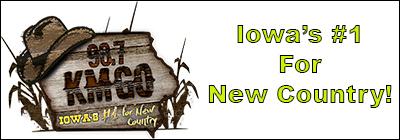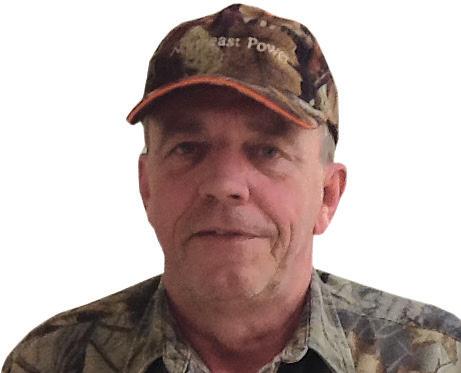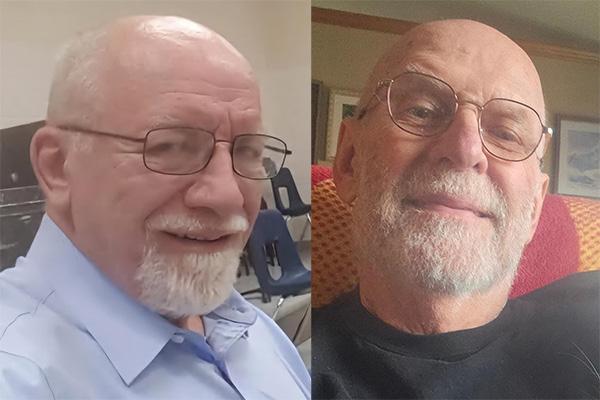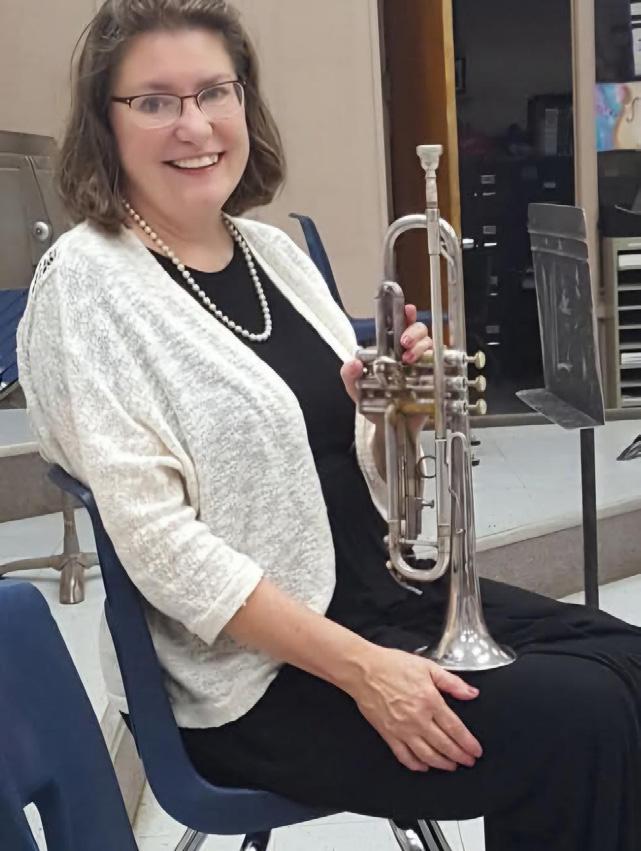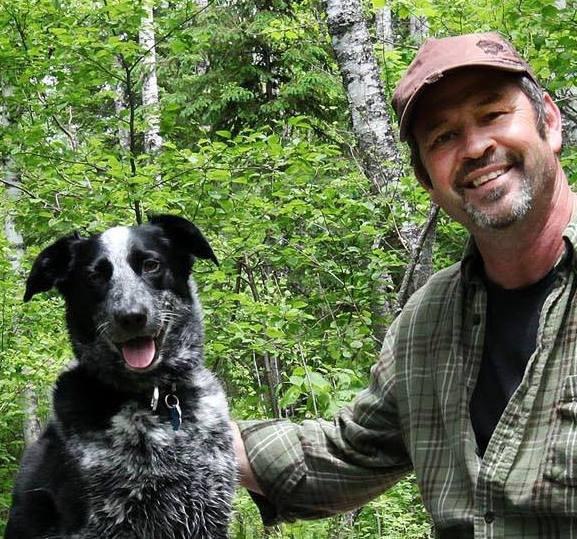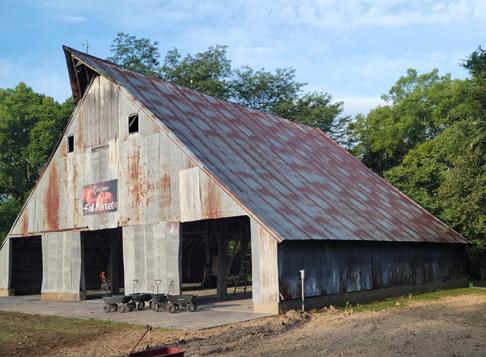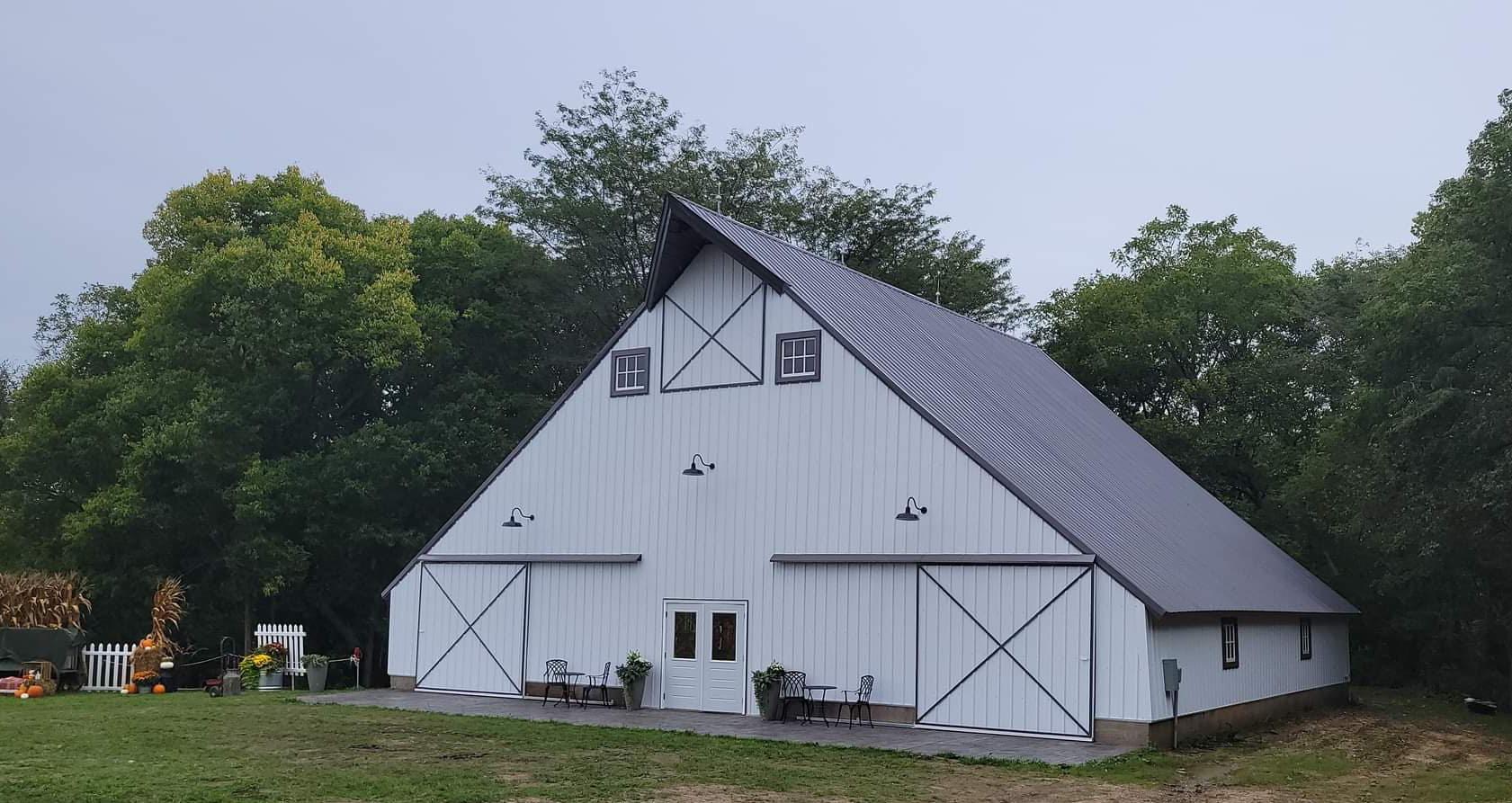Love Story for the Ages
Curt Swarm, Empty Nest
With Valentine’s Day on the nigh, a good ole’ fashion love story seems in order, like strawberries and chocolate. First, a little background: Wyman Martin of Danville is sort of a well known person in Southeast Iowa. Many people say we look alike and get us mixed up. Wyman is younger, but we have the same birthdays. Wyman likes to joke around. People will come up to him and, thinking he’s me, ask him what he’s writing about this week. He’ll make up some fantastical story. The person
Wyman Martin (left) and Curt Swarm. People sometimes get the two confused and ask Martin what he’s writing about this week.
make up something, like, “My pet
We made a
and it was made into bacon. (BELOW) Nancy Martin holding the same Getzen trumpet she played as first chair in the eighth grade, 50 years ago reads Wyman like a book, too!)
scratches their head, Wyman chuckles and recants. It’s all for fun, something we need a lot more of.
Anywho, when Wyman was in the seventh grade, his family moved and switched from the New London School District to Danville School District. His first class at Danville was on Monday, November 30, 1970. It was band practice. Mr. Smith, the band teacher, put Wyman into the first section of trumpets, in fourth chair. Wyman looked down the row of four chairs. In the first trumpet chair was the prettiest girl he had ever seen. Her name was Nancy. She was in the 8th grade, and Wyman was love struck.
This is a Valentine’s Day love story, so of course it has a happy ending, like the maraschino cherry on top of a banana split. Nancy and Wyman were mar-
ried, and Wyman became the band teacher in that same Danville school, in that same room. He used to look down the row of four trumpet chairs and could still see Nancy in eighth grade smiling back at him. It took Nancy moving on to high school for Wyman to make first trumpet. Nancy and Wyman have two boys, Joel, 36, and Micah, 38. Nancy is a retired elementary school teacher with Morning Sun and still substitute teaches at Morning Sun. She is President of the Danville Library Board and volunteers there about three times a week. She is active at church with the missions committee, choir, and children’s group. She loves family time, and is an energetic reader. In 2024 she read 104 books. (She
Like songs of the sirens, Nancy’s and Wyman’s trumpets lured the two together in love, not destruction. Wyman played his cards right. He retired as Junior High Band Teacher in the spring of 2021, in the same room, teaching the same class, that he attended during his first hour, on his first day, 51 years earlier— with the same girl, now a woman and his wife. A love story for the ages.
BTW: I was getting my license plates at the court house the other day. The clerk looked at me and said, “I never thought my child would go for band, but you sure turned him around, Wyman.” I started to correct her, but couldn’t make myself do it.
He’ll
pig.
mistake
Birds and Cows
It was still snowing when I shoveled about six inches of snow from the deck. We were expecting several more inches overnight, and I wanted to stay ahead of the game. So, I cleared about five more inches of snow just before going to bed.
I got up bright and early in the morning, stoked the woodstove, put on a pot of coffee, and then went outside to clear driveway. The snowblower easily handled thirteen inches of fresh snow. A lot of snow blew back on me, but still, it was much easier than shoveling by hand.
After clearing the drive, I came inside to get a cup of coffee. It was cold outside. A shiver trembled over my body while removing my coat, boots, and hat at the front door. Fortunately, I kept the deck cleared the night before, so there would be little snow to shovel by hand. I would clear
the deck and feed the birds, after warming up a bit by the woodstove. The Arco, Norseman Grog smelled great brewing, and it tasted even better, so I had a second cup.
Looking outside, there was only about two inches of new snow on the deck. I filled a container with sunflower seeds for the birds, setting it on the kitchen counter by the back door. When I went to get my coat, and hat, they were wet from the melted snow. I did not relish the idea of putting them back on to go outside, nor did I want to take time to get dry clothing. “This can wait until later,” I said.
Looking through the kitchen window, I saw a wee chickadee hopping around the floor of the deck under the bird feeder. She was alone, poking her head into the deep snow looking for something to eat. Granted, two inches of snow is nothing. It’s not deep at all – unless you’re a chickadee. Then, the snow is neck deep. It was cold, and I felt sorry for her. It reminded me of a story from long ago:
Many years ago, there was a successful young rancher, who
lived in the northwestern Montana Territory. Carson Hawthorn was his name; a bachelor who was very devout, and ambitious. He already owned a few hundred acres of prime ranch land in a valley alongside a creek, at the base of the Cabinet Mountains. The Hawthorn Ranch proved quite bountiful.
An abundance of quality grassland was available for cattle to graze in the spring and summertime. Carson raised enough beef to supply all the people of this growing area, and then some. In the fall, cattle drives would commence, moving the surplus cattle to other larger markets as far away as Ashley, which is now Kalispell; Montana’s seventh largest city.
Feed supplies could run low, so it was necessary to reduce the herd before winter. It was equally important to give the trail boss, and his crew, enough time to return to the ranch before the snows arrived. Carson was able to put up plenty of hay to feed the smaller winter herd until spring calving repopulated the herd for the next season.
A ranch needs plenty of water year-round, and the creek was a dependable source.
One might need to break through ice in the wintertime, but the water was still there.
Through the milder seasons, the sound of steady water flowing over the creek’s rocks, added tranquility to the beautiful and prosperous ranch. Some people believed there was gold to be panned in that creek, but Carson was not interested in pursuing fantasies of finding gold; he was a rancher, a cattleman at heart. To him, this tributary to the Kootenai River, was an important source of water. That’s all.
The Kootenai River is unique as it flows south from Canada, about 70 miles into the United States. Then, the river turns back north, running through the north east Territory of Idaho, returning to Canada. The winding river flows another 500 miles before it joins
with the larger Columbia River. The confluence of the Columbia, and Kootenai Rivers, eventually run to the Pacific Ocean. It is a fascinating waterway.
Eventually, gold was found in the creek bordering the Hawthorn Ranch, and a few other creeks in the region. Word spread fast, and by 1867, nearly 600 men converged on the area, panning the creek, hoping to strike it rich, while living in a mining camp.
The camp was named Libbysville, and the stream, Libby Creek. Both named after Elizabeth Allen (Libby), the daughter of Stephen Allen, a pioneer miner. But the rush for gold was short lived as there wasn’t enough found to make it worth the effort. Their
dreams of becoming rich were dashed, but these men still had to live, and some had families to support.
Disappointed, many men moved on, while others went to work for companies that were mining lead, silver and other minerals found beneath the Cabinet Mountains. Still, others went to work in the logging and timber industry. There was a high demand for lumber in the growing community. Meanwhile, the Northern Pacific Railroad took notice of the area’s growth and prosperity. They surveyed a future route which would run south of Libbysville.
Libbysville, was abandoned; the small town moved downstream, around Kootenai River’s big bend, to meet the rails. You might say the railroad had a lot of pull. In 1889 the Montana Territory, became our 41st state. By 1890 the area was booming. Many houses, buildings, and roads were constructed. 1892 proved to be a big year for the blossoming community.
The name Libbysville, was shortened to Libby, and became an official town in the new state of Montana. In 1892, the first school was built, and the Libby Miner, published their first newspaper. The highly anticipated first train, carrying passengers and freight, arrived on
the completed Northern Pacific Railroad. Things were going swell, but it wasn’t until 1897 when Libby’s first church building was erected; the First Presbyterian Church. Carson Hawthorn was a founding member of this new church; a devout man who never missed Sunday services.
In 1905 there was a snow storm over north western Montana. It started snowing Friday evening, around dinnertime. Sometimes the snow fell moderately, and other times it was heavy, but it never stopped snowing until after 11 on Saturday night. By Sunday morning, Libby was covered with deep snow, and it was bitterly cold.
From his kitchen, Carson concluded the snow was fortytwo inches deep: the top rail of his jack leg fencing was buried, but he could still see the angled tops. The cattle needed hay, so he bundled up and went to his barn. Carson, who was now
in his early sixties, loaded a tall stack of hay onto a special wagon, fitted with skis. He hitched a team of two draft horses, who pulled the wagon into the first paddock.
Carson could see his cattle huddled in a shelter on the far side, and the cattle saw him, but only one cow was willing to push through the deep snow to come eat. He disconnected the wagon, returning the draft horses to the barn. Next, he saddled a quarter horse. Although the town was stilled by the heavy snowfall, Carson set out to attend Sunday services.
Inside, the empty church was cold. Pastor Johns, was surprised to see Carson. “Brother Hawthorn, I appreciate your effort to join us, however, services have been cancelled because of the snow. I’m sure you understand.” Carson nodded his head.
“I understand,” Carson said. “But before I go, I have a question.”
The minister stopped to listen. “Despite the snow, I pulled a full wagon of hay the paddock to feed my cattle, but only one cow pushed through the snow to eat. The rest stayed under the shelter. Now, do you think I should’ve fed that one cow, or take all the hay back to the barn?”
Pastor Johns, was humbled. “I understand, Brother Hawthorn. You take a seat, I’ll stoke the fire, and begin the service.” The minister climbed the steps to the pulpit. The small church building quickly warmed. Was it from the woodstove, or Pastor Johns’ sermon?
front door. “Thank you for coming, Brother Hawthorn,” he said while shaking Carson’s hand.
Carson paused. “I’ve another question, Pastor Johns.” The preacher nodded. “This morning, when I took hay out to the paddock, and only one cow showed up, do you suppose I should’ve made her eat the whole load of hay?”
HEDRICK, IOWA
Pastor began by speaking to the evils of the world: gluttony, greed, and sloth. He got more wound up as he spoked of pride, dishonesty, and envy. By the time he got to lust, drunkenness, and promiscuity, Pastor was on a roll. “Vengeance is mine, saith the Lord.” With a bible in one hand, the other waved with fury as he preached of brimstone, hellfire, and damnation to unrepentant sinners!
Finally, Pastor Johns’ tone changed. He spoke softly, and calmly as he told of God’s love, mercy, and forgiveness to those who follow the Lord. Pastor preached for a full ninety minutes, pouring everything he had into that sermon.
Finally, Pastor Johns took a deep breath. “Well, that concludes our service for this morning.” He descended from the pulpit to see the sole parishioner off at the
I smiled contemplating Brother Hawthorn’s message. Outside, the little bird searched relentlessly for something, anything, to eat. I put on my wet coat and hat, and then slipped into my boots. The little bird flew away when I walked onto the deck. Still, I cleared a large area beneath the bird feeder, and scattered enough seed for just one bird. Before going inside, I reflected on the passion of Pastor Johns’ message; to do what’s right.
Under the bird feeder I spread the usual amount of seeds –even if it was for just one bird, and then I poured the rest of the sunflower seeds into the hanging feeder. As soon as I was inside, the little bird returned to eat. I warmed my coffee and when I looked back on the deck, there must have been twenty or thirty chickadees, all enjoying the seeds.
Somehow, I suspect the rest of the cows made their way to the hay wagon in the paddock as soon as Carson Hawthorn rode into town for church on that Sunday morning, in Libby, Montana.

